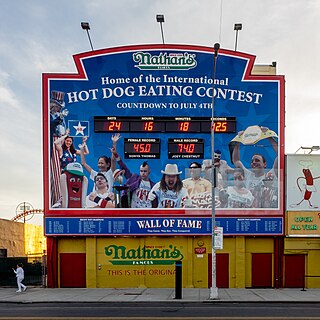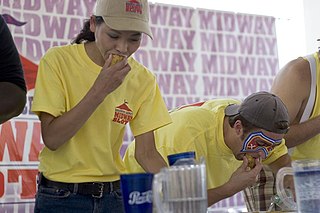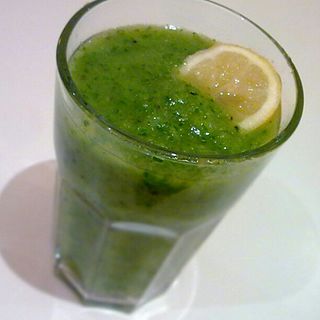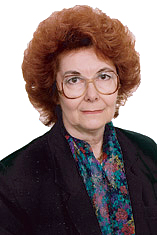Dieting is the practice of eating food in a regulated way to decrease, maintain, or increase body weight, or to prevent and treat diseases such as diabetes and obesity. As weight loss depends on calorie intake, different kinds of calorie-reduced diets, such as those emphasising particular macronutrients, have been shown to be no more effective than one another. As weight regain is common, diet success is best predicted by long-term adherence. Regardless, the outcome of a diet can vary widely depending on the individual.

Takeru Kobayashi is a Japanese competitive eater.

The Nathan's Hot Dog Eating Contest is an annual American hot dog competitive eating competition. It is held each year on Independence Day at Nathan's Famous Corporation's original, and best-known restaurant at the corner of Surf and Stillwell Avenues in Coney Island, a neighborhood of Brooklyn, New York City.

The Canadian Medical Association Journal is a peer-reviewed general medical journal published by the Canadian Medical Association (CMA). It publishes original clinical research, analyses and reviews, news, practice updates, and editorials.

Sonya Thomas , also known by her nickname The Black Widow, and "The Leader of the Four Horsemen of the Esophagus", is a South Korean-born American competitive eater from Alexandria, Virginia. Thomas joined the International Federation of Competitive Eating in 2003 and quickly rose to the top of the ranks, beating competitive eaters such as Eric Booker.

Competitive eating, or speed eating, is an activity in which participants compete against each other to eat large quantities of food, usually in a short time period. Contests are typically eight to ten minutes long, although some competitions can last up to thirty minutes, with the person consuming the most food being declared the winner. Competitive eating is most popular in the United States, Canada, and Japan, where organized professional eating contests often offer prizes, including cash.
Gutbusters is a 2002 Discovery Channel documentary following the efforts of three competitive eaters seeking to gain entry into the Nathan's Famous Fourth of July International Hot Dog Eating Contest.

Joseph Christian Chestnut is an American competitive eater. He is currently ranked first in the world by Major League Eating. He is a California native and resides in Westfield, Indiana. Chestnut's height is 6 ft 0 in (1.83 m); his weight is 104 kilograms (229 lb).

Patrick "Deep Dish" Bertoletti is an American competitive eater from Chicago.

A very-low-calorie diet (VLCD), also known as semistarvation diet and crash diet, is a type of diet with very or extremely low daily food energy consumption. Often described as a fad diet, it is defined as a diet of 800 kilocalories (3,300 kJ) per day or less. Modern medically supervised VLCDs use total meal replacements, with regulated formulations in Europe and Canada which contain the recommended daily requirements for vitamins, minerals, trace elements, fatty acids, protein and electrolyte balance. Carbohydrates may be entirely absent, or substituted for a portion of the protein; this choice has important metabolic effects. Medically supervised VLCDs have specific therapeutic applications for rapid weight loss, such as in morbid obesity or before a bariatric surgery, using formulated, nutritionally complete liquid meals containing 800 kilocalories or less per day for a maximum of 12 weeks.

Mary Gertrude Enig was a nutritionist and researcher known for her unconventional positions on the role saturated fats play in diet and health. She promoted skepticism towards the consensus in the scientific and medical communities that diets high in saturated fats can contribute to development of heart disease, while she advocated for a diet based on whole foods and rich in certain saturated fats.

Gary Taubes is an American journalist, writer, and low-carbohydrate / high-fat (LCHF) diet advocate. His central claim is that carbohydrates, especially sugar and high-fructose corn syrup, overstimulate the secretion of insulin, causing the body to store fat in fat cells and the liver, and that it is primarily a high level of dietary carbohydrate consumption that accounts for obesity and other metabolic syndrome conditions. He is the author of Nobel Dreams (1987); Bad Science: The Short Life and Weird Times of Cold Fusion (1993); Good Calories, Bad Calories (2007), titled The Diet Delusion (2008) in the UK and Australia; Why We Get Fat: And What to Do About It (2010); The Case Against Sugar (2016); and The Case for Keto: Rethinking Weight Control and the Science and Practice of Low-Carb/High-Fat Eating (2020). Taubes's work often goes against accepted scientific, governmental, and popular tenets such as that obesity is caused by eating too much and exercising too little and that excessive consumption of fat, especially saturated fat in animal products, leads to cardiovascular disease.
The following outline is provided as an overview of and topical guide to anthropology:
Pulsus Group is a health informatics and digital marketing company and publisher of scientific, technical, and medical literature. It was formed in 1984, primarily to publish peer-reviewed medical journals. As of 2016, Pulsus published 98 hybrid and full open-access journals, 15 of which had been adopted as the official publications of related medical societies. Pulsus Group also conducts conferences in association with scientific societies.

Major League Eating (MLE) is an organization that organises professional competitive eating events and television specials. The stated mission of Major League Eating is to maintain a safe environment for all events, to create a dynamic and enjoyable fan experience, and to help sponsors develop, publicize and execute eating events in a wide variety of food disciplines. The league airs its annual Nathan's Famous Fourth of July International Hot Dog Eating Contest on ESPN.
Obesity in Pakistan is a health issue that has effected concern only in the past few years. Urbanisation, fast food, changing lifestyles and the fact that Traditional Pakistani Cuisine tends to be high in fat and sugar are among the root causes contributing to obesity in the country. Pakistan is ranked 165 in terms of its overweight population, with 22.2% of individuals over the age of 15 crossing the threshold of obesity. This ratio roughly corresponds with other studies, which state one-in-four Pakistani adults as being overweight. In Pakistan, the problem of excess weight is quite high among adults.

Matthew Kai "Megatoad" Stonie is an American competitive eater and YouTuber. He is the number five ranked competitive eater in Major League Eating. Stonie won the 2015 Nathan's Hot Dog Eating Contest, dethroning 8-time defending champion Joey Chestnut. Stonie has gained fame from his YouTube channel, to which he uploads video footage of his eating challenges.

Mark Adam Hyman is an American physician and author. He is the founder and medical director of The UltraWellness Center and was a columnist for The Huffington Post. Hyman was a regular contributor to the Katie Couric Show until the show's cancellation in 2013. He writes a blog called The Doctor’s Farmacy, which examines many topics related to human health and welfare.

Miki Victoria Sudo is an American competitive eater. She won the women's competition at the Nathan's Hot Dog Eating Contest every year from 2014 to 2020, unseating Sonya Thomas, who had won the women's competition since its inception in 2011. She captured her eighth title in 2022.

Adam Moran, better known as Beard Meats Food, is a British professional competitive eater and YouTuber.















